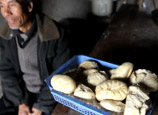
When the central banks of the United States and European countries are actively expanding their balance sheets to cope with the global financial crisis, China’s central bank is quietly shrinking its balance sheet.
According to data from the People’s Bank of China, its assets totaled nearly 29 trillion yuan by the end of last November, nearly 514.7 billion yuan less than the amount at the end of last January. The balance sheet of China’s central bank expanded eight times from 2002 to 2011, but shrank for the first time last year.
Funds outstanding for foreign exchange are the largest category of assets in the central bank’s balance sheet. In the context of “twin surpluses,” the central bank has purchased huge amounts of foreign currency in order to stabilize the yuan’s exchange rate, leading to a substantial increase in its funds outstanding for foreign exchange.
Funds outstanding for foreign exchange reached 25.7 trillion yuan by the end of last November, accounting for nearly 89 percent of the central bank’s total assets.
The central bank’s balance sheet shrank mainly due to a sharp decline in funds outstanding for foreign exchange.
Capital inflows to China grew slower last year because of the economic slowdown, lower returns on investment, looser monetary policy, and smaller gaps between domestic and foreign interest rates.
The country’s funds outstanding for foreign exchange increased over 494.6 billion yuan last year, growing only 41.2 billion yuan each month, far lower than the average monthly increases of 272.4 billion yuan and 231.6 billion yuan in 2010 and 2011 respectively.
“The first decline in the central bank’s balance sheet reflects some positive changes in China’s economic and financial systems,” said Lian Ping, chief economist at the Bank of Communications.
“It shows that such long-term phenomena as massive capital inflows and yuan appreciation have changed. New funds outstanding for foreign exchange dropped markedly, foreign exchange reserves also decreased, and the yuan’s exchange rate stabilized with slight two-way fluctuations. This shows China's balance of payments is moving toward equilibrium.”
The decline in the central bank’s balance sheet does not indicate an inflection point. Lian believes that China’s funds outstanding for foreign exchange will witness a much bigger increase this year than in 2012. It is hard to say whether the central bank’s balance sheet will continue to shrink, but it is certain that the expansion rate of the balance sheet will drop.
Read the Chinese version: 人民币持续升值等现象正得到改观; Source: People's Daily; Author: Tian Junrong
















 Going back home: A standing journey
Going back home: A standing journey


![]()
